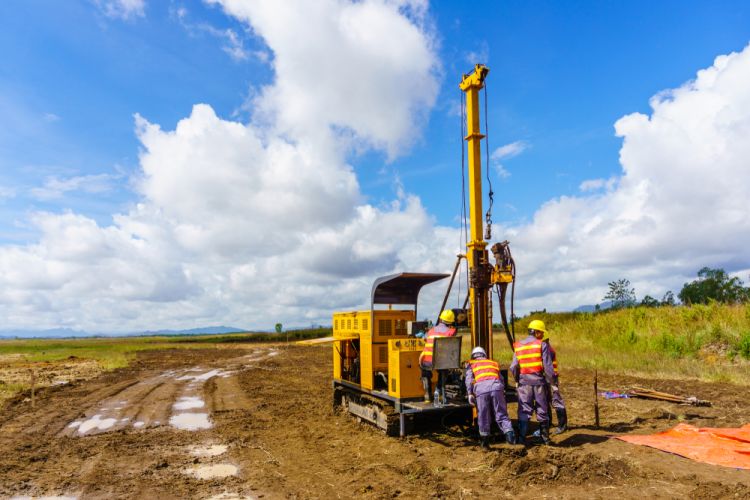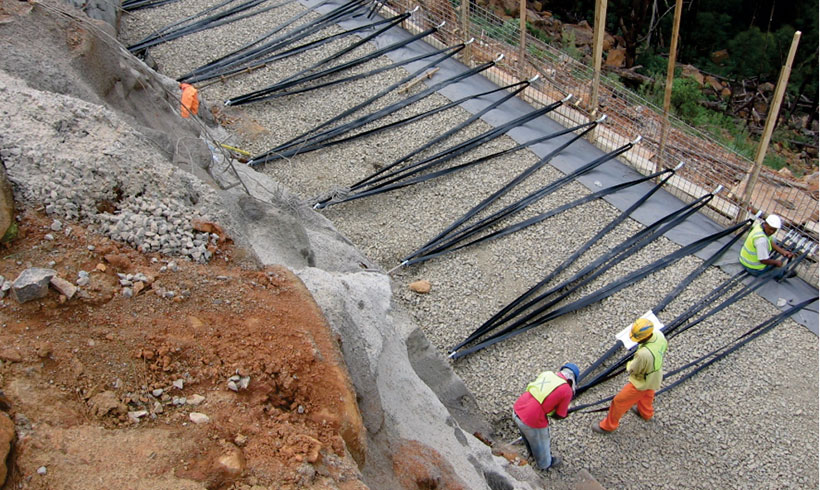Specialized Geotechnical Engineering Solutions for Beginners
Specialized Geotechnical Engineering Solutions for Beginners
Blog Article
The Single Strategy To Use For Specialized Geotechnical Engineering Solutions
Table of ContentsExcitement About Specialized Geotechnical Engineering SolutionsMore About Specialized Geotechnical Engineering SolutionsSome Known Facts About Specialized Geotechnical Engineering Solutions.Some Known Facts About Specialized Geotechnical Engineering Solutions.
They carry out site examinations, gather examples, execute laboratory tests, and evaluate information to examine the viability of the ground for construction projects. Based on their findings, geotechnical engineers give suggestions for structure layout, incline security, preserving frameworks, and reduction of geotechnical dangers. They team up with various other specialists, such as engineers, architectural designers, and building teams, to guarantee that geotechnical considerations are integrated into the overall task layout and execution.
Foundation Layout: Geotechnical engineers play an important duty in designing foundations that can securely sustain the intended structure. They examine the soil conditions and load requirements to identify the suitable foundation kind, such as shallow foundations (e.g., footings), deep structures (e.g., piles), or specialized techniques like dirt renovation. They consider factors such as negotiation limitations, bearing capacity, and soil-structure communication to create ideal foundation designs.
Specialized Geotechnical Engineering Solutions Can Be Fun For Anyone
Below are some types of geotechnical designers: Foundation Designer: Foundation designers specialize in creating and evaluating structures for structures - Specialized Geotechnical Engineering Solutions. They analyze the soil problems, load needs, and site features to figure out one of the most suitable structure kind and style, such as shallow structures, deep structures, or specialized techniques like stack structures
They perform field screening, collect samples, and assess the collected data to identify the dirt properties, geologic formations, and groundwater problems at a website. Geotechnical Instrumentation Engineer: Geotechnical instrumentation engineers concentrate on surveillance and measuring the habits of dirt, rock, and frameworks. They install and maintain instrumentation systems that keep an eye on variables such as soil settlement, groundwater levels, slope motions, and architectural variations to examine efficiency and supply early cautions of possible concerns.
In the workplace environment, geotechnical engineers use specialized software program devices to perform calculations, create designs, and evaluate data. Specialized Geotechnical Engineering Solutions. They prepare reports, evaluation job specs, connect with customers and employee, and coordinate job tasks. The office setting offers a favorable atmosphere for research study, analysis, and partnership with other professionals involved in the project
They frequently visit task websites to perform website investigations, evaluate geotechnical conditions, and gather information for evaluation. These brows through entail taking a trip to different locations, in some cases in remote or challenging surfaces. Geotechnical designers may execute dirt tasting, conduct tests, and monitor construction tasks to make sure that the geotechnical elements of the project are being implemented appropriately.
Not known Facts About Specialized Geotechnical Engineering Solutions
Geotechnical engineers additionally work in specialized geotechnical labs. Geotechnical research laboratory engineers work thoroughly in these settings, handling testing devices, running instruments, and tape-recording information.
Preserving Walls: Creating walls that hold back dirt to protect against landslides and provide stability on sloped terrains. Embankments and Earthworks: Creating embankments for roadways, trains, and dams to ensure they remain steady under anxiety. top article The mining sector counts greatly on geotechnical design to make certain the safety and longevity of its operations.
With this in mind, we have developed our program to prepare trainees for success. The Geotechnical Engineering program at the University of Delaware provides chances for innovative research and study in: Dirt and rock technicians Soil-structure communication Integral modeling Computational geomechanics Structure and earth structures engineering Ground improvement Slope security and landslide stablizing Liquefaction of dirts and quake design Lab characterization of geomaterials and soil reinforcement Environmental geotechnics Offered the solid requirement for enhancement to our nation's infrastructurethe American Culture of Civil Designers provided the U.S.
Geotechnical engineering is a branch of civil design; nonetheless, it includes utilizing scientific methods and concepts to gather and translate the physical buildings of the ground. Geotechnical designers are associated with all stages of the layout of frameworks, from concept to construction. Their job is necessary in the style and planning procedure as they evaluate the integrity of dirt, clay, silt, sand, and rock, prior to construction starting.
Specialized Geotechnical Engineering Solutions Can Be Fun For Anyone
This is followed by a ground examination based upon the searchings for of the workdesk research study and involves trial matching and sampling to reveal any prospective concerns. Geotechnical engineers function within multidisciplinary groups, sustained by intermediate and jr engineers as well as by CAD professionals. As a senior geotechnical engineer on a hydro plant job, tasks might consist of joining technical reviews (e.g., peer reviews), tailings clog inspections, dam security evaluations, and various other studies associated with the style and building of mine waste facilities.
While some experts are experts solely in geotechnics, others might function under titles like design geologist or ground engineer within similar capacities. As a geotechnical designer, you'll need to: develop and keep partnerships with clients and other professionals included in the site, throughout each projectmaintain security criteria on site bear in mind price ramifications when you make recommendationsstudy geological maps and airborne photographs from a series of resources and from different time periodsexamine building and construction intends to see exactly how feasible they are based on your understanding of the siteinvestigate dangers or geological dangers for the sitesearch for environmentally sensitive features, such as land fill start to develop accurate and expository ground modelsplan field investigationsdrill and analyse samples of bedrock, soil, groundwater and additional products manage various other professionals on sitesolve technological concerns as they develop, such as unanticipated frameworks at drill sitesmonitor conditions throughout and after building to make certain frameworks are secure in the brief and lengthy termadd data gathered on site to your first researchcreate geotechnical computations, illustrations, blog here and 2 or three-dimensional computer designs translating the datamake recommendations concerning the suggested use of the website.
There get more are great deals of possibilities to meet brand-new individuals, as you'll deal with a variety of specialists at every website. The work can be stressful as you may be in charge of the security of others while on site. There is likewise a high degree of financial obligation, as the referrals you make can have major expense effects.

Report this page